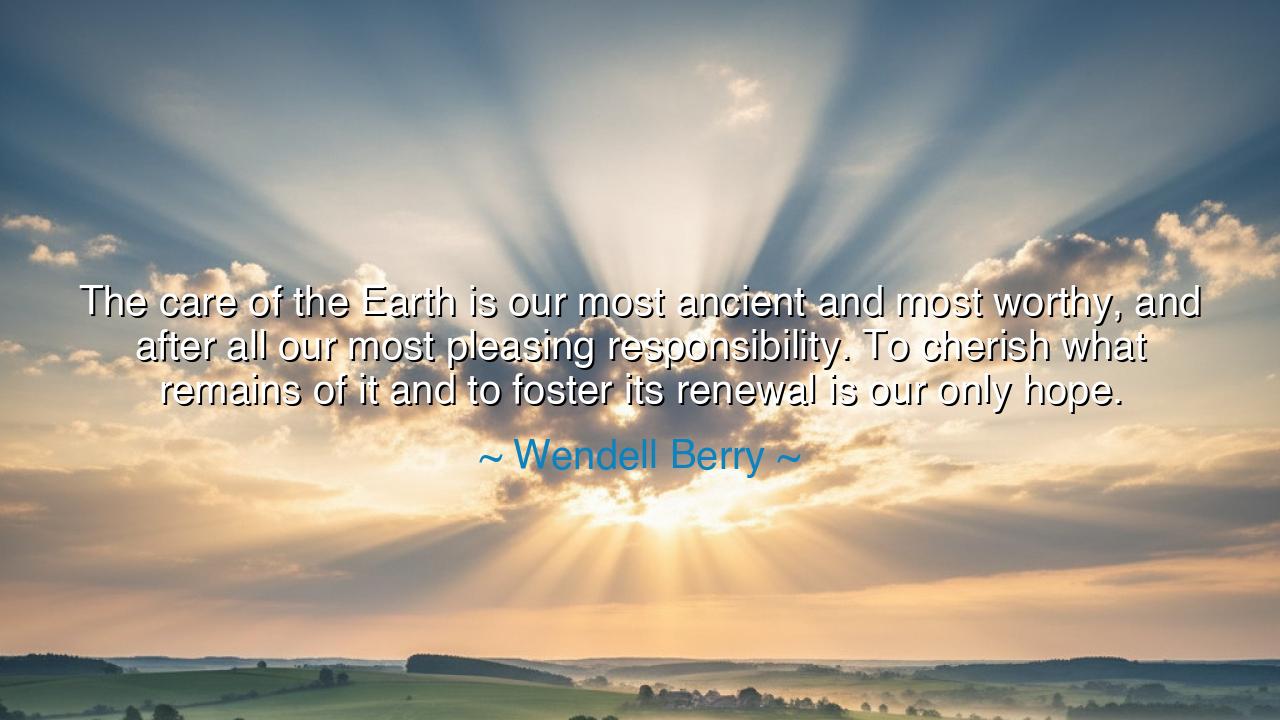
The care of the Earth is our most ancient and most worthy, and
The care of the Earth is our most ancient and most worthy, and after all our most pleasing responsibility. To cherish what remains of it and to foster its renewal is our only hope.






The words of Wendell Berry, “The care of the Earth is our most ancient and most worthy, and after all our most pleasing responsibility. To cherish what remains of it and to foster its renewal is our only hope,” echo like a sacred chant from the dawn of humanity. They are not merely an appeal to environmental stewardship—they are a reminder of a covenant older than civilization itself. In this saying, Berry—poet, farmer, and prophet of the land—calls us to remember who we are: not conquerors of the Earth, but its caretakers, born from its soil and sustained by its breath. His words bind together reverence and duty, beauty and survival, in one eternal truth: that the fate of the Earth and the fate of mankind are one and the same.
Wendell Berry, a writer and farmer from Kentucky, has long spoken as a guardian of simplicity, community, and the natural world. He stands in the lineage of the ancient sages who saw no boundary between spirit and soil. His voice rises from the furrows of the earth itself, reminding modern man—lost amid his machines and cities—that to care for the land is to care for life. In his view, the care of the Earth is not a modern invention or moral luxury; it is the first and greatest commandment of human existence. Long before kings, before nations, before words were written, humans tilled the earth, gathered its fruits, and lived in rhythm with its seasons. To return to that sacred relationship is not regression—it is restoration.
When Berry calls it our most ancient responsibility, he evokes the image of the first humans who looked upon the forests, rivers, and skies with awe and gratitude. They did not see resources; they saw kinship. The Earth was mother, the rivers her blood, the winds her breath. But in our age of consumption, that reverence has faded into forgetfulness. We take without giving, destroy without grieving, and live as though the ground beneath us were not alive. Berry’s words awaken us from this spiritual sleep. He reminds us that to cherish what remains is not merely an environmental act—it is an act of love, of moral and spiritual renewal.
The wisdom of these words can be seen in history’s moments of rebirth. After the Second World War, much of Europe lay in ruins—its soil scorched, its trees cut down, its people weary. Yet from that desolation, countless hands began to plant anew. In Germany, Japan, and across the ravaged lands, reforestation began; farmers sowed seeds once more in fields long abandoned. And as the Earth healed, so did humanity. It was not politics or power that restored the spirit of those nations—it was the humble, patient labor of renewal. Berry’s teaching reminds us that the same work of renewal must now happen on a global scale, for the wounds of the modern world run deep across every continent.
To call this responsibility pleasing is no contradiction. There is joy in service, beauty in stewardship. The tending of the Earth, far from being a burden, is a sacred delight. Those who plant trees they will never sit beneath, who heal streams they will never fish from, who restore soil they will never harvest from—these are the true heirs of eternity. Their joy is not the fleeting pleasure of possession, but the quiet exaltation of belonging. Berry teaches that by fostering renewal, we participate in creation itself; we become co-creators with the divine, mending what has been broken by ignorance and greed.
Yet his warning is also solemn: our only hope lies in this care. The Earth can live without us, but we cannot live without the Earth. If we continue to plunder her forests, poison her waters, and strip her of life, we will find ourselves the authors of our own extinction. The collapse of civilizations—be they Sumerian, Mayan, or modern—has always begun with the neglect of land. But if we turn again toward reverence, humility, and balance, there is hope. The same soil that bears witness to our folly still holds the power to forgive, if we would but kneel and tend it once more.
The lesson, then, is clear and timeless: we must become gardeners of the Earth, not its exploiters. Each person, no matter how small their sphere, can nurture life—planting trees, growing food, conserving water, protecting wild spaces, living with less waste and more gratitude. But beyond these actions lies a deeper transformation: the remembering that we are part of the living world, not separate from it. As the ancients once offered prayers before harvest, let us offer care before consumption, and thanks before taking.
So hear these words, O children of the modern age: to cherish and renew the Earth is not only survival—it is salvation. Let us lay down our arrogance and rediscover the joy of belonging. Let every act of cultivation, every gesture of preservation, be an offering to the generations yet unborn. For when we tend the Earth, we tend the soul of humanity itself. And perhaps, when the twilight of our civilization comes, we may yet look upon the greening world and know that we did not forsake our most ancient and most worthy calling.






AAdministratorAdministrator
Welcome, honored guests. Please leave a comment, we will respond soon